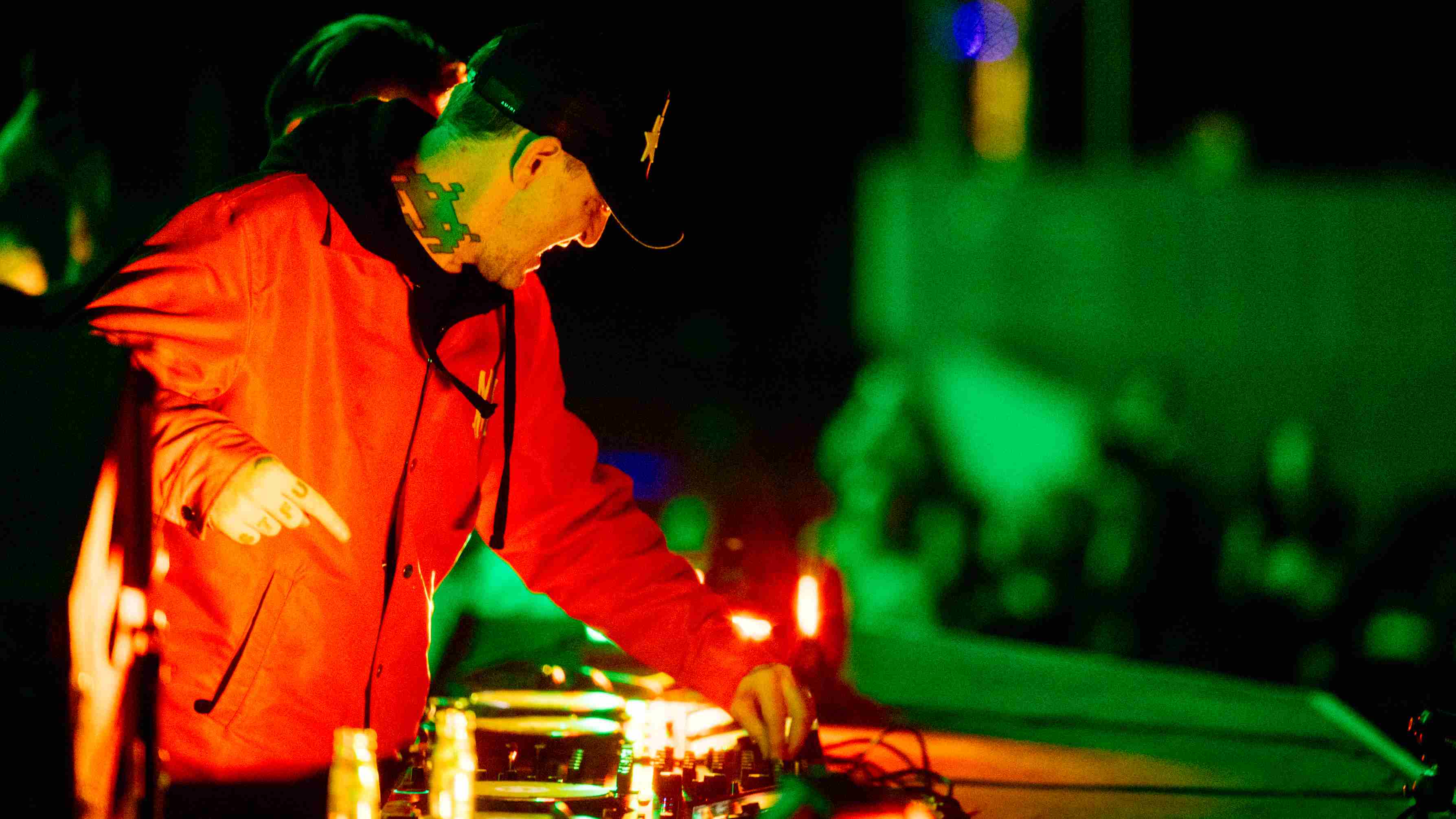Universal Audio expands its guitar effects lineup with four compact stompboxes offering studio-quality compression, reverb and tape echo emulation
These UAFX pedals are smaller, more affordable, with simplified controls, and include the 1176 Studio Compressor, Evermore Studio Reverb, Heavenly Plate Reverb and the Orion Tape Echo
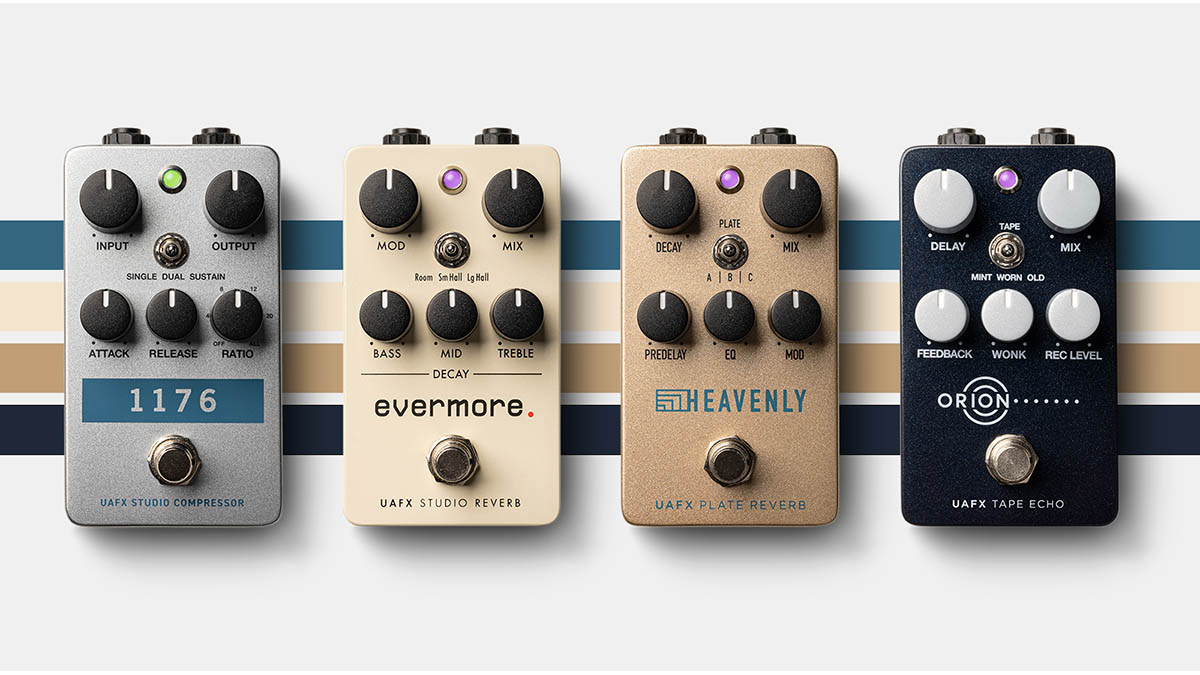
Universal Audio has just unveiled a quartet of guitar effects pedals that are slimmed-down, more compact, and yet still present players with top-quality sounds featuring UAFX’s superlative processing power and UA’s analogue modelling tech.
The word modelling is the key here – these four stompboxes are designed to put classic studio effects on your pedalboard. The new models include the Orion Tape Echo, the Heavenly Plate Reverb, the Evermore Studio Reverb and the 1176 Studio Compressor, and all share a similar enclosure design and control setup, with single footswitches, five knobs per pedal, three-way toggle switch for choosing different modes and sounds, and top-mounted jacks with switchable bypass switches mounted on top, too.
The 1176 Studio Compressor is based on a bona-fide classic from the Universal Audio pantheon, the 1176 Limiting Amplifier that Bill Putnam Sr, founder of UA, first built in 1967. UA has hitherto made them available as a plugin but to have them available for the ‘board is a game-changer, allowing players to add a touch of studio sheen to their electric guitar tone wherever they go.
The control setup should be familiar to anyone who has used the original hardware or indeed the plugin. There are dials for Input and Output gain, while you can dial in the amount of compression you need via Attack, Release and Ratio dials. If you are looking for the “all buttons in” sounds of the original, just dime that Ratio dial as far as it will go.
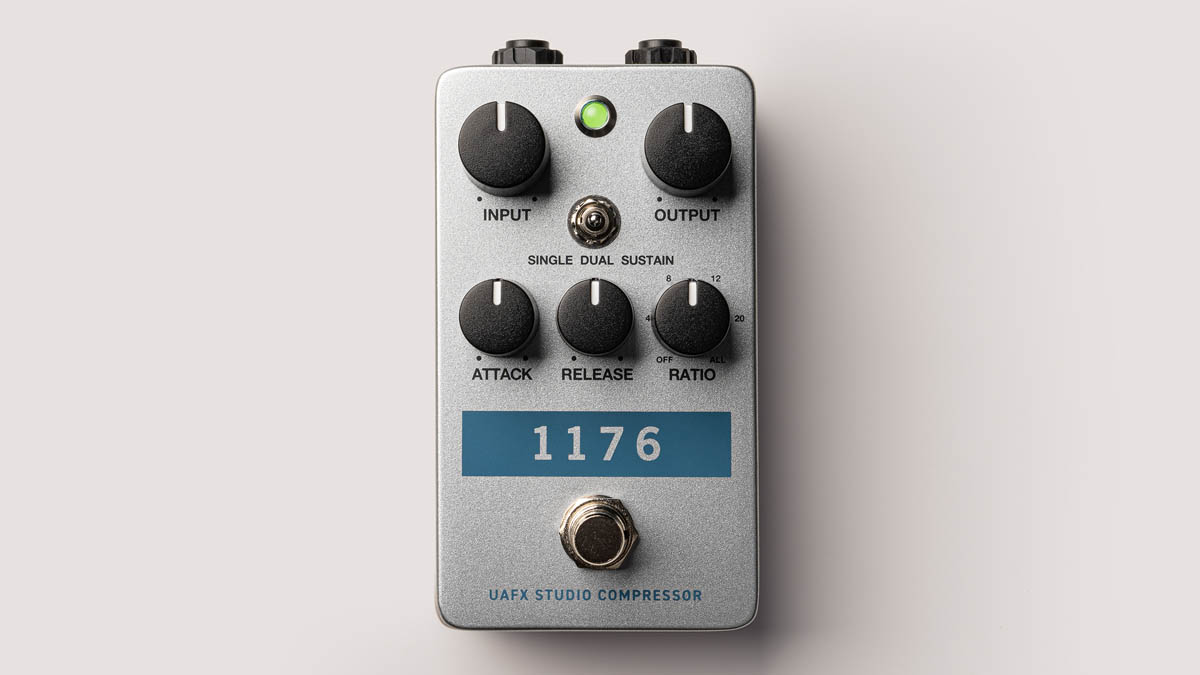
Single, Dual and Sustain modes allow you to use this in a variety of ways and access generations of classic guitar sounds.
“From the subtle squeeze of a single 1176 to the endless sustain of two units in parallel à la Lowell George or the compressed crunch of Led Zeppelin IV, you can get the same iconic tones and effects heard on thousands of classic records with a trio of legendary 1176 setups,” says Universal Audio.
The 1176 Studio Compressor is priced $189/$199.
Get the MusicRadar Newsletter
Want all the hottest music and gear news, reviews, deals, features and more, direct to your inbox? Sign up here.
The Orion Tape Echo is similarly ambitious in attempting to house the sounds of a classic piece of audio processing hardware into a compact pedal, with it’s vintage-voiced analogue repeats modelled after the 70s Maestro Echoplex EP-III. The sounds you hear here have migrated across time and space – or, if you like, from the UAFX Starlight Echo Station.
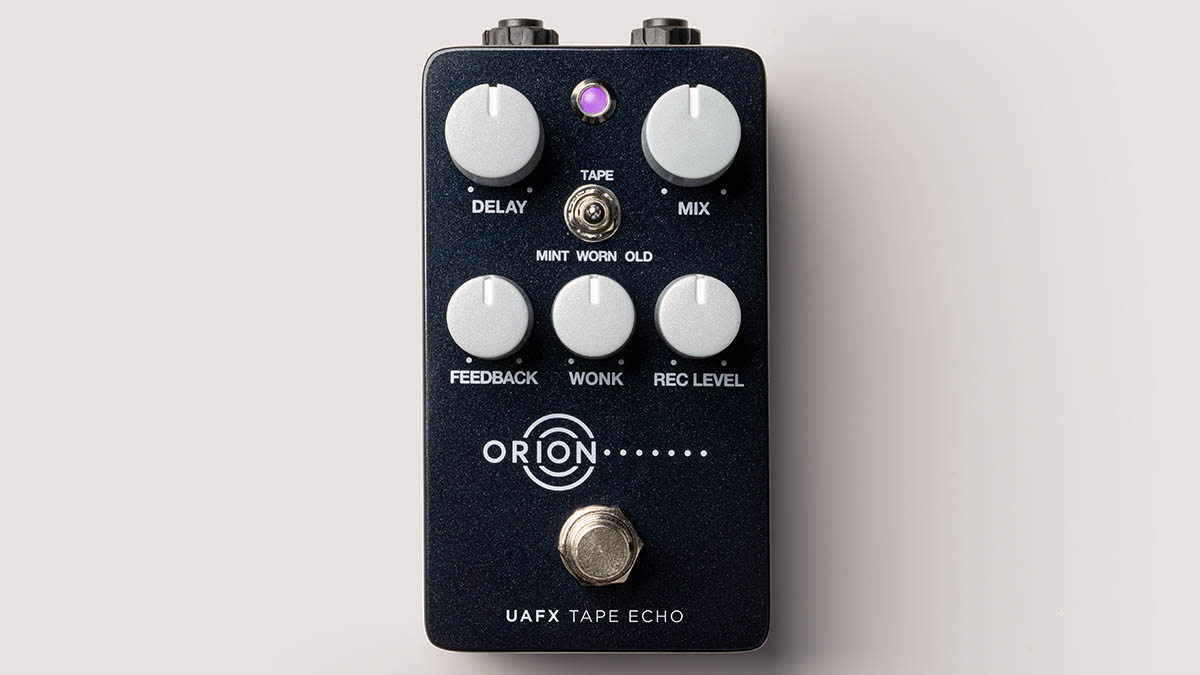
It has controls for Delay to set the repeat time, Mix to control the balance between your guitar signal and the echo, Feedback for the number of repeats, with self-oscillation at its extremes, Rec Level adjusts just how much input gain is fed into that tape, with grit and distortion at higher settings, and finally the wonderfully titled Wonk offers exactly that, an emulation of the sort of glitchy warped sounds you get from an old tape echo when the mechanics and the tape begin to break down – of course, without the worry of anything actually breaking down.
The three-way toggle here selects from Mint tape stock, Worn tape stock, “gently used”, and Old, which is the sort of sound you might get from that dusty old EP-III you picked up at a garage sale.
On the top of the pedal you can switch the preamp on and off, adding that EP-III analogue mojo to taste, and switch between trails mode or true bypass. In the former, those repeats will continue to play out after you switch the unit off. The Orion Tape Echo is priced £199/$219.
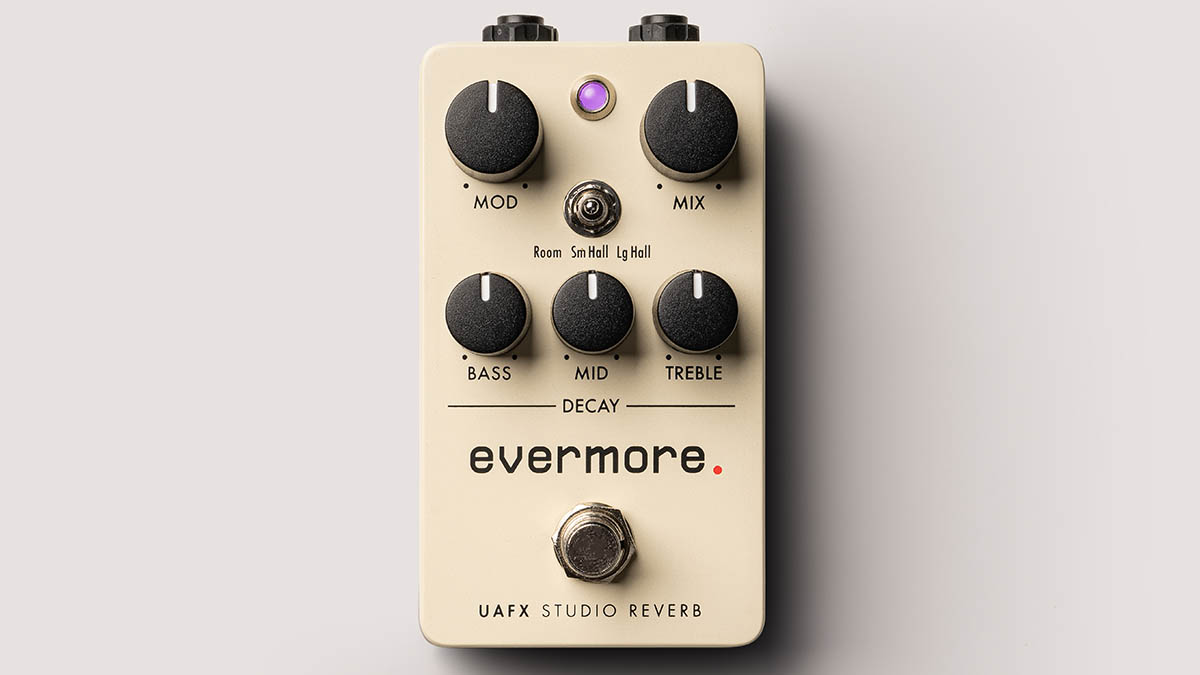
Now for the reverb pedals, and here, too, and in both instances we have sounds that have migrated from their larger flagship UAFX lineup, with the Golden Reverberator unit lending the Evermore Studio Reverb its Hall 224 algorithms for lush vintage digital ambience.
Here you have dials for Mod, Mix, and Bass, Middle and Treble, with the switch selecting between Room, Small Hall and Large Hall modes. You can use this for adding vintage digital reverb, nicely decayed, subtle, or go all out and dial in a setting to make a soundscape of your open chords.
Sliders at the top select between Trails and True bypass mode, and turning the Pre-delay on or off.
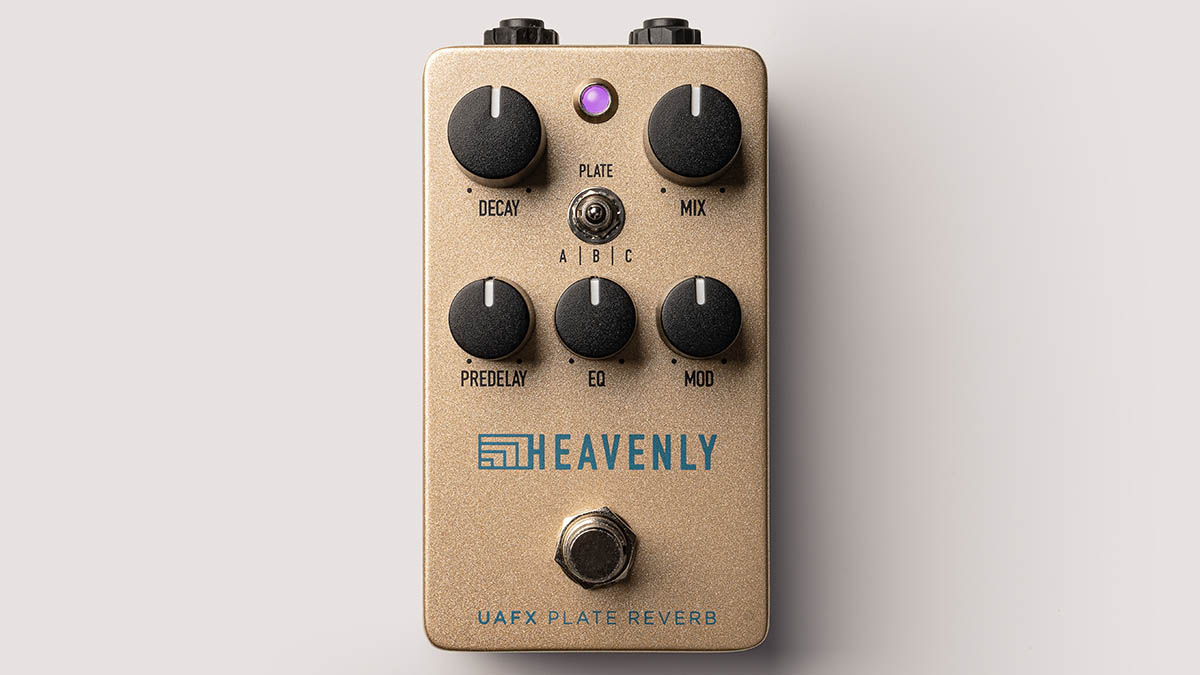
Finally, the Heavenly Plate Reverb is just that, plate-style reverb, inspired by the “rich, immersive textures of 1950’s German-made studio plate reverbs” with Universal Audio’s tasting notes describing the ambience as “dense and moody”.
There are three core sounds to choose from: Vintage Bright, Vintage Dark, and Modern Full. Pre-delay, EQ, Mod and Rate controls present a fuss-free platform for dialling in your sound. The Mod Rate can be changed from slow to fast via the slider at the pedal’s top, and again there is the option to run this true bypass or in Trails mode.
Both the Heavenly Plate Reverb and Evermore Studio Reverb are priced £199/$219, and they’re available now. For more details, head over to Universal Audio.
Jonathan Horsley has been writing about guitars and guitar culture since 2005, playing them since 1990, and regularly contributes to MusicRadar, Total Guitar and Guitar World. He uses Jazz III nylon picks, 10s during the week, 9s at the weekend, and shamefully still struggles with rhythm figure one of Van Halen’s Panama.
“For guitarists who crave an unrelenting, aggressive tone that stands out in any mix”: The Fortin Meshuggah head is the amp every metal player wants – now you can get its crushing tones in a pedal
“A fully playable electro-mechanical synth voice that tracks the pitch of your playing in real time”: Gamechanger Audio unveils the Motor Pedal – a real synth pedal with a “multi-modal gas pedal”










